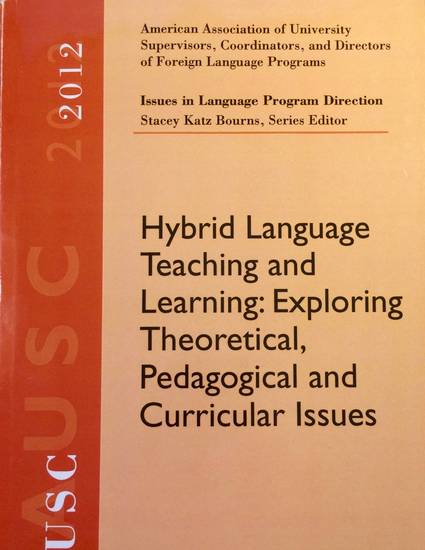
Book
Hybrid language teaching and learning: Exploring theoretical, pedagogical and curricular issues
(2013)
Abstract
Hybrid language teaching and learning, also referred to as blended learning, has become an increasingly popular model for the delivery of foreign language (FL) courses at the college level in the United States. HYBRID LANGUAGE TEACHING AND LEARNING: EXPLORING THEORETICAL, PEDAGOGICAL AND CURRICULAR ISSUES addresses a number of theoretical and applied topics related to hybrid/blended contexts. The volume is useful for readers unfamiliar with hybrid approaches, as several chapters highlight practical concerns and contain suggestions from authors who have experience implementing and maintaining college-level hybrid FL courses. In addition, the volume serves to disseminate empirical work that focuses on the linguistic outcomes of learners in hybrid FL learning contexts. Finally, the issue of open educational resources/open access is discussed in the context of hybrid FL courses.
Introductory chapter by Fernando Rubio and Joshua J. Thoms; Subsequent chapters by Robert Blake; Senta Goertler; Luis Cerezo; Lara Ducate, Lara Lomicka, and Gillian Lord; Dolly Jesusita Young and Jason Lee Pettigrew; Fernando Rubio; Susanne Rott; Joshua J. Thoms; Carl S. Blyth; Amy E. Rossomondo.
Keywords
- hybrid,
- language,
- teaching,
- learning,
- pedagogical,
- theoretical,
- curricular
Disciplines
Publication Date
January 1, 2013
Editor
Fernando Rubio, Joshua J. Thoms
Publisher
Heinle Cengage Learning
Citation Information
Rubio, Fernando, and Joshua J. Thoms. Hybrid Language Teaching and Learning : Exploring Theoretical, Pedagogical and Curricular Issues. Boston: Heinle Cengage Learning, 2013.
